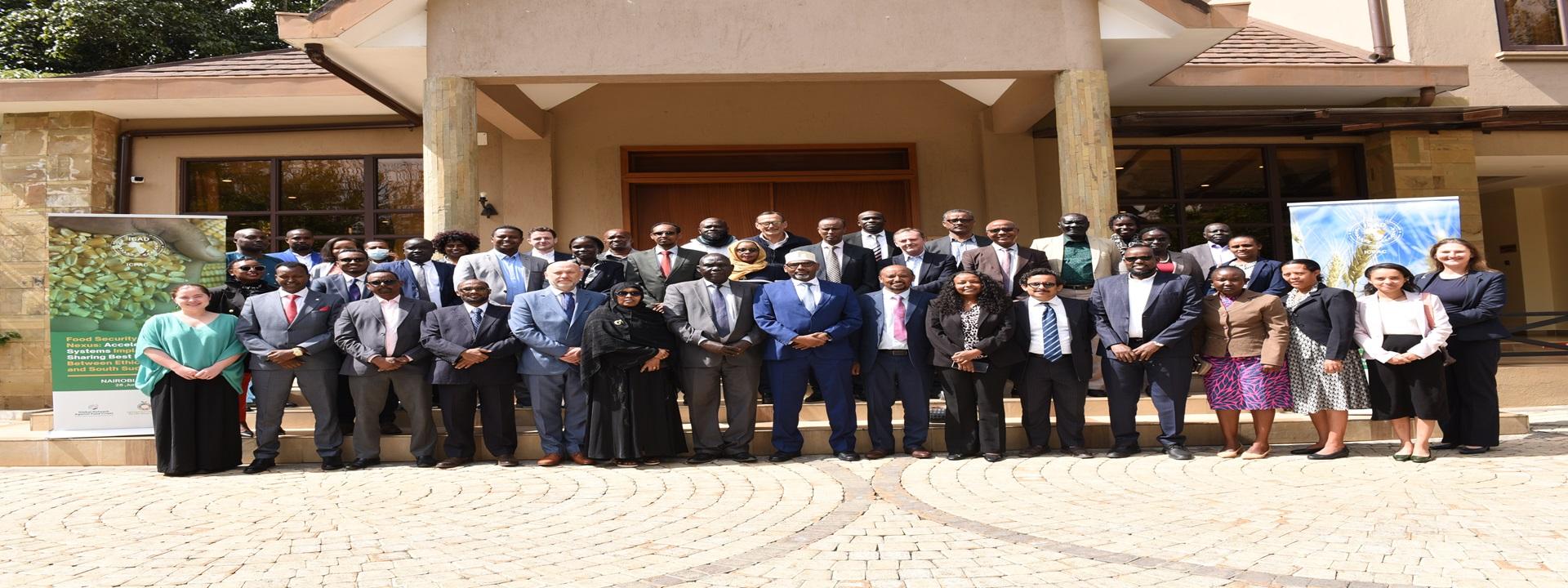Facilitating the Sharing of Best Practice Between Ethiopia, Somalia and South Sudan, Strengthening Alignment with Regional Commitments, and Accelerating National and Regional Implementation
28 June 2024, Nairobi, Kenya
Background: Following, and in line with, the commitments made at the Intergovernmental Authority on Development (IGAD) High-level Ministerial meeting held in October 2022, IGAD, the Global Network Against Food Crises (GNAFC) – Technical Support Unit and the Humanitarian-Development-Peace (HDP) Nexus Coalition carried out consultative missions to Ethiopia and Somalia with the aims of identifying key priorities and areas of coordinated support to the governments to strengthen and accelerate the operationalization of national food systems pathways. Building on these missions, a two-day workshop in Naivasha, Kenya and a Ministerial meeting in Nairobi, Kenya were held from June 26-28 to exchange perspectives and jointly identify common ways forward, while reaffirming high-level national commitments. The meeting convened senior experts and policy makers from Ethiopia, Somalia, and South Sudan.
The meeting was carried out against the following objectives:
- Facilitate the sharing of good practice and knowledge exchange between Ethiopia, Somalia and South Sudan
- Consolidate a harmonized and coordinated approach to food systems strengthening in line with regional commitments – this includes the identification of successful actions that can be replicated within the region and highlighting remaining common challenges or bottlenecks that need to be addressed to accelerate implementation
- Identify common priorities to accelerate food systems transformation across Ethiopia, Somalia and South Sudan and ensure that progress in taking forward these priorities is anchored in appropriate global, regional and national support mechanisms
- Secure Ministerial Approval: Obtain official validation and endorsement of the identified priorities and corresponding activities during the two-day technical meeting to ensure progress is anchored in high-level political support.
Therefore, we, the Ministers and Heads of Delegations from IGAD Member States comprised of Ethiopia, Somalia, and South Sudan having met in Nairobi, Republic of Kenya, on June 28, 2024 on the occasion of the high-level regional meeting, reaffirm our commitment to strengthen and accelerate national and regional efforts to address the prevalent food insecurity in the region, while pursuing longer-term development efforts that enhance the resilience and livelihoods of vulnerable communities;
Appreciate the hospitality and warm welcome extended to the conference delegates by the Government and the people of the Republic of Kenya, as well as the efforts being made to address food crises in the context of the commitments made by the Member States, IGAD, and development partners;
Further appreciate the initiative taken by IGAD through its Climate Prediction and Applications Centre (ICPAC) and the support provided by the Global Network against Food Crises (GNAFC) to bring together delegates and regional level partners from the IGAD Member States to share collective understanding of the regional food insecurity, its evolving dimensions and drivers.
Recognize the scale of the challenges at hand, as recent data indicates that approximately 24% of the population in East Africa faced significant food insecurity in 20231. Among this group, more than 12 million individuals were categorized as being in Emergency (IPC Phase 4), with an additional 80,000 individuals expected to reach Catastrophe (IPC Phase 5) in Somalia and South Sudan. Between April and June 2024, it is projected that more than 7million individuals in South Sudan and over 3 million in Somalia will face severe levels of acute food insecurity (IPC Phase 3 or higher) 2. Likewise, an estimated 16 million people in Ethiopia are expected to be in need of emergency food assistance in 2024 (Ibid).
Acknowledge that the persistent food crises are worsened by systemic risks and a range of contributing factors, including conflict-induced displacement and climate-related and economic shocks at national, regional, and global scales.
Further acknowledge that these combined factors lead to fragile food systems which adversely affect the socio-economic wellbeing and long-term development of the countries and populations in the region.
Appreciate the role of the HDP Nexus principles in food systems transformation through inclusive multi-stakeholder engagement, national ownership, multi-sectoral coordination and people-centered approaches, and hereby;
- Declare our joint commitment to regional and national capacity-building that translates strategic policy commitments into actionable results that promote sustainable food systems and the prevention of food and nutrition crises.
- Encourage efforts to extend national-level progress in food systems strengthening to sub-national-levels through an inclusive approach that prioritizes the needs of those most vulnerable to, and affected by, food and nutrition crises.
- Reaffirm national leadership, supporting coordination and the harmonization of ministerial priorities and the translation of these priorities into national development planning frameworks.
- Urge IGAD and partners to initiate the development of a regional (IGAD) food systems communications strategy to sustain high-level political support, at the national, regional, and global levels.
- Commit to further strengthening coordination mechanisms within government and between government and key stakeholders, to prioritize regional and national needs, and continue to highlight longer-term investment and building resilience.
- Commit to the building of data management solutions that reference accurate, updated data, employ monitoring, evaluation and learning (MEL) frameworks, consolidating relevant analysis through the development of food systems dashboards and research products accessible at the global, regional, national, and local levels.
- Recommend appropriate financing mechanisms to support food systems strengthening, drawing on the full range of financing flows, including national budget allocation, development partners’ resourcing priorities and private sector investments.

